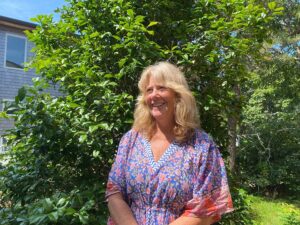WELLFLEET — In the 1960s, psychedelics were part of the American counterculture, banned because of their mind-altering power. In 2023, they’re the subject of a pending bill in the Massachusetts legislature, a first step toward their potential legalization.

At the heart of the shift is the drugs’ potential for treating a range of psychiatric disorders as well as psychological distress at the end of life. Several Outer Cape community leaders who have been pursuing related training and education say they’re encouraged by the prospect of legalization in the state.
“If and when the use of psilocybin becomes legal, then the Lily House would support our residents in its use,” said Dawn Walsh, an end-of-life doula and executive director of Wellfleet’s Lily House. “In the meantime, we’re committed — myself personally and the Lily House as an end-of-life hospice home — to facilitating conversation around the use of psilocybin at the end of life.”
Last October, as part of a week of death education events, the nonprofit Lily House hosted a panel titled “Cannabis and Psychedelics to Ease the End-of-Life Journey.” The panel discussed the use of those substances to lessen the psychological distress that accompanies terminal illness and end-of-life situations.
On the panel were Gwynne Guzzeau, executive director of Helping Our Women, who holds a certificate in psychedelic therapies and research; Patricia van Dijkhuizen, a licensed certified social worker and a psychedelic practitioner; and Jack Hudson, founder of a Quincy-based medical cannabis dispensary.
Van Dijkhuizen, who has spent summers in Truro for over 30 years, recently moved to Provincetown. After she retired, she searched for a social issue to focus on, became concerned about the “rising tide of anxiety and depression,” especially among young people, and got a master’s degree in social work. Reading Michael Pollan’s 2018 book How to Change Your Mind piqued her interest, she said, and she began looking into psychedelic therapies and research.
Van Dijkhuizen went on to earn psychedelic practitioner certification from the Dutch organization Synthesis and complete an end-of-life doula certification through the Diaspora Psychedelic Society in Jamaica. She will join the California Institute of Integral Studies’ Center for Psychedelic Therapies and Research Boston cohort this September. Now in an “apprenticeship” stage of her training, van Dijkhuizen is also planning to travel to Costa Rica for practical experience.
She is interested in applications of psychedelics in reducing “emotional and spiritual pain, as well as physical pain” at the end of life. She sits on the development committee of the Lily House and hopes to serve as an end-of-life doula there when it becomes operational.
Guzzeau, too, has traveled outside the U.S. to explore the use of psychedelics. She hosted an integration circle at Wellfleet Preservation Hall in the summer of 2018 after going to a women’s retreat in Jamaica and having what she called a “remarkable” psychedelic experience there.

In Jamaica, Guzzeau learned about ongoing psychedelic research from Dr. Rosalind Watts, a psychologist and clinical lead for Imperial College London’s psilocybin trial. Guzzeau, a lawyer with an elder law background, later completed the CIIS program. Going forward, she’d like to see more conversation and education about psychedelics on the Outer Cape.
There may be plenty of time for talking. If passed, “An Act Relative to Plant Medicine,” or H.1754, and a state Senate companion bill, S.1009, would decriminalize “the possession, ingestion, obtaining, growing, giving away without financial gain” of “no more than two grams of psilocybin, psilocyn, dimethyltryptamine, ibogaine, and mescaline” for adults. The bill was brought before the Joint Committee on the Judiciary in a hearing on legislative proposals relating to crime on June 13, but its timeline going forward is unclear.
“Decriminalization basically means no one’s going to interfere with you possessing or using, in this case, psilocybin,” said state Sen. Julian Cyr, who represents the Outer Cape. Cyr supports the legalization of psilocybin.
“But if you wanted to actually produce, manufacture, distribute,” he added, “you’d need legalization.” Cyr said he expects psilocybin will follow “a similar trajectory as recreational marijuana.” In Massachusetts, the journey from decriminalization, approved by a ballot measure in 2008, to the first legal recreational sales of marijuana took 10 years.
“What I see happening is planting seeds,” Guzzeau said.
Guzzeau also emphasized the importance of decriminalization.
“Fundamental to this work is a sense of safety, in where you are, and what you’re doing,” she said. “I had the resources to fly all the way to Jamaica and go to a place where I could feel safe knowing that, while I was on this journey, I didn’t have a risk of it being interrupted by law enforcement.”
Editor’s note: An earlier version of this article, published in print on July 13, referred incorrectly to Patricia van Dijkhuizen as a licensed psychedelic practitioner. She is a licensed certified social worker and a certified psychedelic practitioner.
